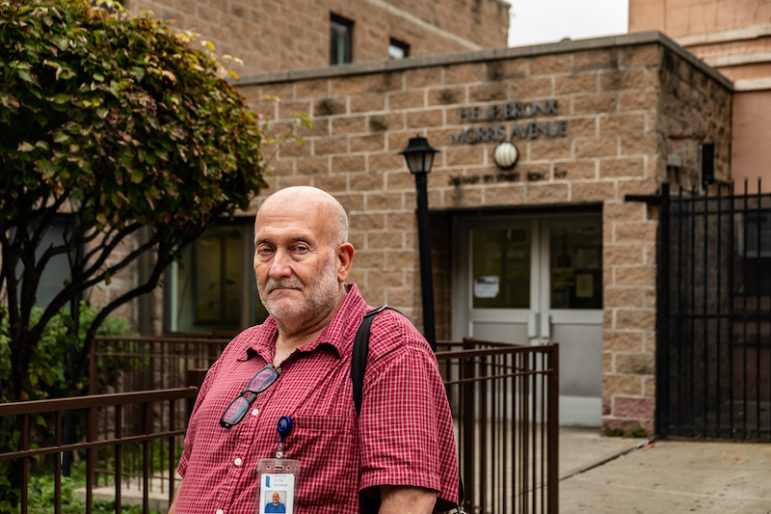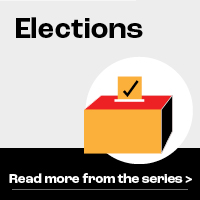Advocacy groups are dispensing information, answering questions and offering rides to help unhoused New Yorkers exercise their rights.

Adi Talwar
On a recent Friday, Coalition For the Homeless’ Shelter Specialist Sam Winfrey in front of HELP Bronx Morris AvenueOn the morning of Friday, Oct. 23, the day before early voting began in New York State, Sam Winfrey, a shelter specialist for the Coalition For The Homeless, stood outside the HELP USA family shelter in the Bronx. Winfrey is one of the monitors that provide some level of oversight for certain shelters at the request of the city.
In addition to their normal duties, like checking to see if internet is working (it was spotty) and giving residents a crisis management number, he spent the morning asking residents about their voting plans, trying to give them more information about their polling locations if they need it.
“Any time we do outreach with clients, we are pushing the voting,” Winfrey says. (Like all non-profits, Coalition for the Homeless can not advocate for candidates during their voter outreach, but can provide information and assistance about the voting process.) Between the hours of 7 and 8:30 a.m., Winfrey spoke to 46 heads of household outside the shelter, he said. Fourteen had already voted by absentee ballot. Six people needed help finding a polling location. Many were in a rush with kids in tow heading out to appointments.
One shelter resident that Winfrey had spoken with earlier came back outside to speak with him again, holding a flyer from the Coalition for the Homeless that Winfrey had given her. The resident, Cymier Briggs, 33, plans to vote on Nov. 3. She had never voted before, and said that she had not been able to vote recently because of a conviction. (People on probation for felony convictions have been able to vote since 2018 if they receive a conditional pardon from the governor.)
She wanted to know where her polling place was – she wasn’t sure if her aunt’s address in Manhattan would be the correct address to look up or if it should be the shelter.
“It’s wherever you registered to vote,” Winfrey told her. That meant her aunt’s place. Winfrey looked up the address on his phone and told Briggs that her polling place would be P.S. 154. Briggs knew exactly where that was, because her cousin went to school there.
“Yes, I am, I really am,” Briggs told City Limits when asked if she was excited about voting. She cited her displeasure with the current U.S. president, saying her son was also distrustful of his behavior.
“I don’t like him at all, and my son doesn’t like him. And my son, he’s 10. And he sees all of the wrong things that he’s doing. He recognizes all of it,” she said.
Signs of enthusiasm
There has been more enthusiasm than usual for voting during this election, and service providers say that includes people experiencing homelessness, many of whom are eager for their turn at the ballot box. Non-profits and community groups have been stepping up to provide information to unhoused people, who face additional hurdles to voting, including a lack of a fixed mailing address and, for some, a lack of identification, which is required for some first-time voters who did not register with an ID.
“I said to all of the interns and everybody, ‘Whenever you finish helping a client with something ask them if they’re registered,’ you know? Now it’s like, ‘Okay, whenever you finish with a client, ask them if they went to vote,’” says Kate Barnhart, Director of New Alternatives for Homeless LGBT Youth.

The help is necessary, says Catherine Trapani, executive director of Homeless Services United, because people experiencing homelessness can have challenges accessing information. Many unhoused people may not know they can register to vote without a permanent address, or they may not receive mailers from the Board of Elections as their addresses change.
“I think a lot of the traditional ways that people might otherwise be reminded are not always as accessible to a person without a permanent home,” Trapani says.
Trapani says the Department of Homeless Services typically does not send out a reminder e-mail to program providers about voting. But on Oct. 23 of this year, DHS did send out an e-mail to providers about early voting, which City Limits viewed. It included reminders that people who are registered to vote will continue to be registered unless they have moved their residence outside the city or county where they registered, or unless they have not voted or confirmed their address in two consecutive presidential elections, or if they are adjudged mentally incompetent by a court.
According to the letter, voters do not need to present ID unless they did not provide ID with their registration.
Getting to the polls
Carol Van Deusen, 76,is a volunteer with the League of Women Voters as well as Upper West Side Open Hearts,an organization formed to provide support to residents of a temporary homeless shelter in the Lucerne Hotel that has been the subject of much-publicized backlash. Van Deusen helped to register Lucerne residents prior to October’s deadline, setting up a table at the organization’s “Free Store” events where clothing, food, toiletries and other supplies are provided.
Van Deusen says the Lucerne residents that she spoke with were registered to vote in other parts of the city, which puts their polling locations relatively far from the Upper West Side. To make the voting process easier, she is trying to arrange for Metrocards to be distributed and for ride-hail services to be reserved for those who request it. She also plans to have volunteers greet residents at their polling locations with snacks.
Van Deusen has reached out to Project Renewal, the provider running the Lucerne site, with a list of names of residents who expressed interest, although she had not heard back when she spoke with City Limits.
She says at least some residents have expressed enthusiasm about voting. “One of the people came up to me and said, ‘I can’t wait.’ How many of them will feel that way? We don’t know,” she says.
Nan Roman, CEO of the National Alliance To End Homelessness, says that transportation to and from polling places is an issue across the country, especially in areas with fewer public transit options. “We’ve been encouraging homeless programs to help transport people to the polls,” Roman says.
Giselle Routhier, policy director with the Coalition for the Homeless, says lack of transportation is just one of the hurdles people experiencing homelessness may face when casting a ballot, and for this reason they encourage their clients to have a voting plan.
“Someone homeless might be bounced around from shelter to shelter. Maybe they’re not super close and may be not have a plan for getting there. We’ve definitely been reiterating to have a plan,” she says.
When you don’t have ID
According to the NYC Board of Elections, registered voters don’t need to show ID unless they didn’t provide ID upon registration.
Barnhart says this has been an issue with her clients at New Alternatives, most of whom are aged 18 to 24, because they are often first-time voters and people who had previously been registered in another state.
“If you get kicked out for being gay, your parents don’t usually stop and pack up your ID and all that, so kids show up without anything,” Barnhart says. And even when people do have ID, the chances of it getting stolen when one is sleeping on the subway, on the street or in a shelter is high, she says. New Alternatives helps people get new IDs, but the process has become more onerous because many offices are closed due to the pandemic. Additionally, some transgender clients may not have ID that resembles how they currently look.
This is the case for Elaine Sharma, a 26-year-old transgender woman living in a shelter in the Bronx, where she is also registered to vote. Sharma says she left her parents’ home in Baldwin because her parents did not accept her gender identity. She plans to vote for the first time on Nov. 3 but has not yet looked up her polling location. Sharma says her current ID was acquired prior to her transition and as such, it uses her dead name, or pre-transition name, and her appearance is drastically different from the photo on her ID.
“I have people looking at the ID and wondering where did you find this,” she says. “There’s going to be some issues at the polling place very likely.” She says she plans to vote despite this, for Joe Biden, whom she is not enthusiastic about.
Without an address
The lack of a fixed address still causes challenges for unhoused people trying to vote, despite legal precedent that lowered barriers. Barnhart says many people who are registered use their shelter addresses, but may have moved from shelter to shelter so much that they may not remember where they registered.
“It becomes a whole process to figure that out,” she says.
A 1984 lawsuit, Pitts v. Black, filed by the Coalition for the Homeless, established that New Yorkers without permanent residence, including people living on the street, could register to vote. And the federal McKinney Act also forbids states from requiring proof of a physical address at the polls, according to Roman.
Routhier, with Coalition for the Homeless, says the lack of a fixed address can still be a problem for people who request absentee ballots, though she says she has not yet received a complaint from someone this election cycle who has not received an absentee ballot. Both Routhier and Barnhart said they allow clients to use their offices as a mailing address for this reason.
To vote or not to vote?
An enormous hindrance to voting for people experiencing homelessness is that it may not be a high priority; most people who are unhoused are more focused on keeping themselves or their family safe and fed, or concentrating on securing housing, and may not have time to make a voting plan.“People who are struggling are focused on concrete immediate survival,” Barnhart says.
While there is no data on voter turnout for unhoused people specifically, across the board, lower-income people display lower voter turnout than people with higher incomes.
Despite this, several organizations noted an increase in enthusiasm for voting among people experiencing homelessness, mostly as a negative reaction to the president. Barnhart says among homeless LGBT youth, there has been frequent concern about many of the president’s policies.
“Every time Trump is doing something crazy I have young people coming to me scared and worried and asking me to explain what’s happening,” Barnhart says.
Routhier says this increase in enthusiasm is part of a trend this year. “A lot of folks who are experiencing homelessness are feeling like it’s very important for them to vote,” she says. The pandemic and recession have only driven home the importance.
“People have lost income” and gained a deeper “understanding of the role that government plays in alleviating economic challenges and providing resources. I think a lot of people understand the stakes,” she says.
For many, that has more to do with fears about the current status quo than enthusiasm for his challenger. “I’m just like, ‘I’ve got to do something about this,’” Sharma says of her vote. “If things got this bad this year, imagine what will happen next year.”








